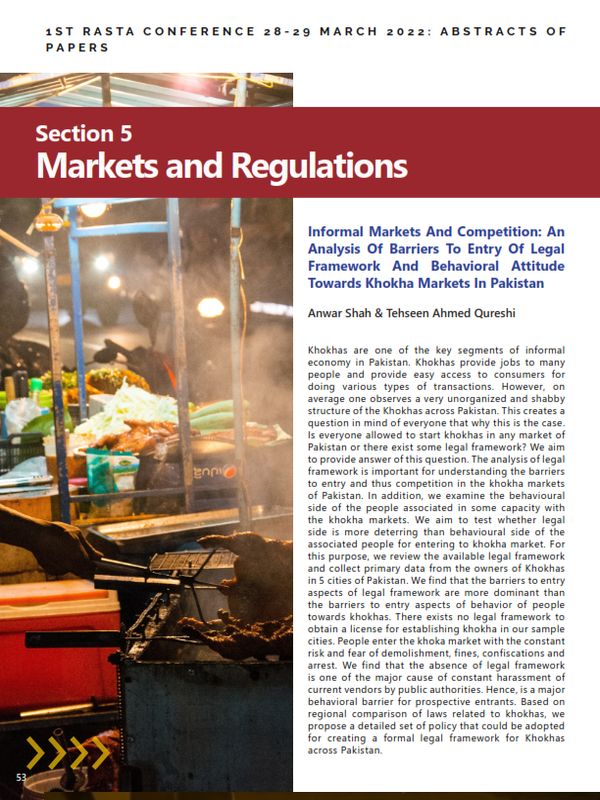
Pakistan Institute of Development Economics
- Home
Our Portals
MenuMenuMenuMenuMenuMenuMenu - ResearchMenuMenuMenuMenuMenuMenuMenu
- Discourse
- The PDR
- Our Researchers
- Academics
- Degree Verification
- Thesis Portal
- Our Portals
1st RASTA Conference 28-29 March 2022: Abstracts of Papers (Section 5: Markets and Regulations)
Session 5: Markets and Regulations
Informal Markets And Competition: An Analysis Of Barriers To Entry Of Legal Framework And Behavioral Attitude Towards Khokha Markets In Pakistan
Anwar Shah & Tehseen Ahmed Qureshi
Khokhas are one of the key segments of informal economy in Pakistan. Khokhas provide jobs to many people and provide easy access to consumers for doing various types of transactions. However, on average one observes a very unorganized and shabby structure of the Khokhas across Pakistan. This creates a question in mind of everyone that why this is the case. Is everyone allowed to start khokhas in any market of Pakistan or there exist some legal framework? We aim to provide answer of this question. The analysis of legal framework is important for understanding the barriers to entry and thus competition in the khokha markets of Pakistan. In addition, we examine the behavioural side of the people associated in some capacity with the khokha markets. We aim to test whether legal side is more deterring than behavioural side of the associated people for entering to khokha market. For this purpose, we review the available legal framework and collect primary data from the owners of Khokhas in 5 cities of Pakistan. We find that the barriers to entry aspects of legal framework are more dominant than the barriers to entry aspects of behavior of people towards khokhas. There exists no legal framework to obtain a license for establishing khokha in our sample cities. People enter the khoka market with the constant risk and fear of demolishment, fines, confiscations and arrest. We find that the absence of legal framework is one of the major cause of constant harassment of current vendors by public authorities. Hence, is a major behavioral barrier for prospective entrants. Based on regional comparison of laws related to khokhas, we propose a detailed set of policy that could be adopted for creating a formal legal framework for Khokhas across Pakistan.
Revitalization Of Street Economy In Pakistan: The Case Of Islamabad
Nasir Iqbal & Saima Nawaz
The study aims to provide an economic analysis of the street economy in the twin cities of Pakistan. The survey-based analysis of 1,863 fixed street vendors working in twin cities shows that lack of formal education and unemployment inclined individuals to choose street vending business as a profession. The analysis reveals formal-informal solid economic linkages, beneficial for shop owners and street vendors. The formal business (shops) benefits from the pedestrian traffic street vendors attract by selling low-cost products. At the same time, street vendors use the formal sector to buy a product and use storage spaces. The average monthly revenue of street vendors is Rs. 114,708 (US$ 740) and, on average, earns a significant profit amounted to US$ 212 per month (29% of total monthly revenue). The street vendor made, on average, US$ 571 investment to run vending business and around 60% of SVs use their own money to start a street vending business. A street vendor pays around US$ 107 monthly as an operational cost, and more than 51% of the total operating cost incurred by the street vendors falls under the category of rent paid to the owner of the shop. The total number of street vendors in Pakistan is 753,690, and the annual national contribution of street vendors in the GDP of Pakistan is Rs.1,037.45 billion (US$6.69 Billion) based on revenue data we collected from our survey, which is still underreported due to the nature of the informality of the sector. The lack of legal protection is one of the significant challenges faced by street vendors. We find that 98% of SVs operate without any legal protection in the market. The reported economic loss due to informality constitutes around 62% of monthly revenue, 215% of net monthly profits. The multidimensional vulnerability index (MVI) shows that approximately 21% of street vendors are acute vulnerable, while more than 25% of SVs are vulnerable. The multivariate analysis shows that socioeconomic vulnerability has a negative and significant impact on monthly profits. Around 57% of SVs fall below the poverty line, being treated as poor. The economic analysis of street vending provides numerous insights for policymakers and other stakeholders, including businessmen, market associations, regulatory authorities, administrative bodies, and social protection agencies.
Regulatory Environment Of The Professions In Pakistan: An Outline
Umer Ijaz Gillani
This study aims to provide, firstly, an accurate description of the law which govern the professions and set up their regulatory structures. Second, this study puts together, for the first time ever, some basic demographics of the professions – for instance, the total number of lawyers, doctors and auditors etc., their gender breakdowns and, in some case, their growth rates too. Finally, based on the study, I have charted out an agenda for policy debate which is informed by legal and demographic realities, not just anecdotes and personal whims.
This is primarily a descriptive piece rather than a prescriptive one. However, the aim of this descriptive research is to provide a basis for having a more informed policy debate on proposals for reform of the professional regulators. This is a structure which rests upon almost one dozen primary statutes and even more voluminous delegated legislation. The history, structure, powers and behaviour of each of the regulators – Bar Councils, Nursing Councils, Engineering Council etc. – is unique; but there are also some commonalities. Effective public critique and reform of the professions is not possible without taking stock of this complex regulatory structure. The study confirms the general impression that the regulatory framework of the professions in Pakistan is based entirely upon the model of “self-regulation”.



